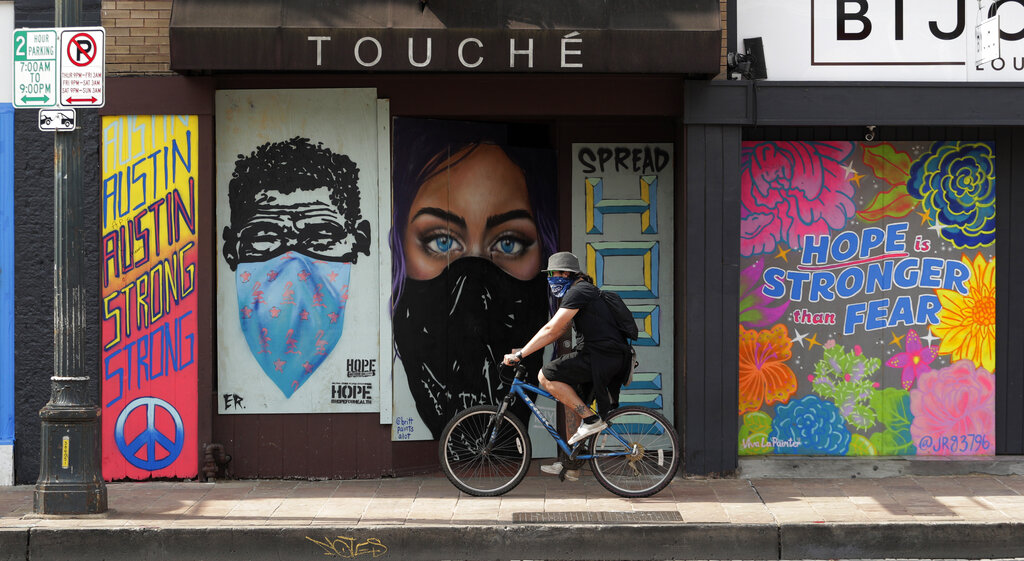The UN Security Council underlined the need for unity and solidarity with those affected by the COVID-19 and expressed support for the efforts of Secretary-General Antonio Guterres on the potential impact of the pandemic, as the powerful UN arm met for the first time to discuss the crisis that has engulfed the world.
The Council, under the Presidency of the Dominican Republic, held a closed video-conference session in connection with the impact of COVID-19 on the issues that fall under the Security Council's mandate.
Guterres also briefed the Council.
In Press Elements issued following the meeting, the 15-nation Council said Members expressed their support for all efforts of the Secretary-General concerning the potential impact of COVID-19 pandemic to conflict-affected countries and recalled the need for unity and solidarity with all those affected.
Briefing the Council, Guterres said the world faces its gravest test since the founding of the United Nations 75 years ago and there is fear that the worst is yet to come especially in the developing world and countries already battered by armed conflict.
The Council has been seen as missing in action as the coronavirus pandemic across the world has so far left over 1.6 million people infected and more than 95,000 dead.
Guterres stressed that the engagement of the Security Council will be critical to mitigate the peace and security implications of the COVID-19 pandemic.
Indeed, a signal of unity and resolve from the Council would count for a lot at this anxious time, he said.
To prevail against the pandemic today, we will need to work together. That means heightened solidarity, he said.
Guterres said while the COVID-19 pandemic is first and foremost a health crisis, it also poses a significant threat to the maintenance of international peace and security -- potentially leading to an increase in social unrest and violence that would greatly undermine our ability to fight the disease.
The UN Chief said he is particularly concerned that the COVID-19 pandemic threatens to further erode trust in public institutions, particularly if citizens perceive that their authorities mishandled the response or are not transparent on the scope of the crisis.
Efforts to discuss the coronavirus situation in the Council were stalled till now mainly due to the stalemate between Washington and Beijing.
The Council's two veto-wielding permanent members have been arguing over the origins of the virus and how any possible Council statement or resolution should reflect that.
Sources told PTI that there was no discussion during the meeting on a resolution on the COVID-19 situation.
US Ambassador to the UN Kelly Craft said Washington reiterates the need for complete transparency and the timely sharing of public health data and information within the international community.
'The most effective way to contain this pandemic is through accurate, science-based data collection and analysis of the origins, characteristics, and spread of the virus. We cannot stress enough how important these methods are, Craft said in her remarks, appearing to make a veiled reference to China.
Craft stressed that successfully stopping the spread of this virus depends on the commitment from each one of us to work together in good faith.
China's Ambassador to the UN Zhang Jun said to overcome this global challenge, solidarity, cooperation, mutual support and assistance is what we need, while beggar-thy-neighbor or scapegoating will lead us nowhere. Any acts of stigmatization and politicization must be rejected.
UN Director at the International Crisis Group, a non-governmental organization focussed on preventing conflict, Richard Gowan told PTI the Security Council still seems unable to measure up to the scale of the COVID-19 crisis.
He said there is a sense that China and the US in particular are more keen on scoring political points against one another in New York than throwing their united weight behind common action on the crisis.
COVID-19 has laid bare the lack of trust among Council members all too acutely, he said.
We must hope that the big powers gradually grasp that such a severe global threat demands a multilateral response. Most of the elected members of the Council feel that it is essential to do more. India, preparing for its own stint on the council starting next year, should throw its weight behind the elected members' efforts to address this situation, Gowan said.
Louis Charbonneau, the United Nations Director at Human Rights Watch, said in a statement to PTI that the Council has been missing in action since the coronavirus outbreak began. It's painful to watch their paralysis, though it's obviously nothing new. They're so often deadlocked these days, he said adding that many of the crisis countries on the Council's agenda such as Syria, Yemen, Libya have seen COVID-19 cases already.
Unless the world acts, it's only a matter of time before those and other situations go from bad to much, much worse, he said.
Ahead of the Council meeting, two draft resolutions had been circulated for negotiations.
One by Tunisia on behalf of the 10 non-permanent members called for 'an urgent, coordinated and united international action to curb the impact of COVID-19.
A French text focussed on Guterres' call for a global ceasefire as part of a 'humanitarian pause' to combat the pandemic.











